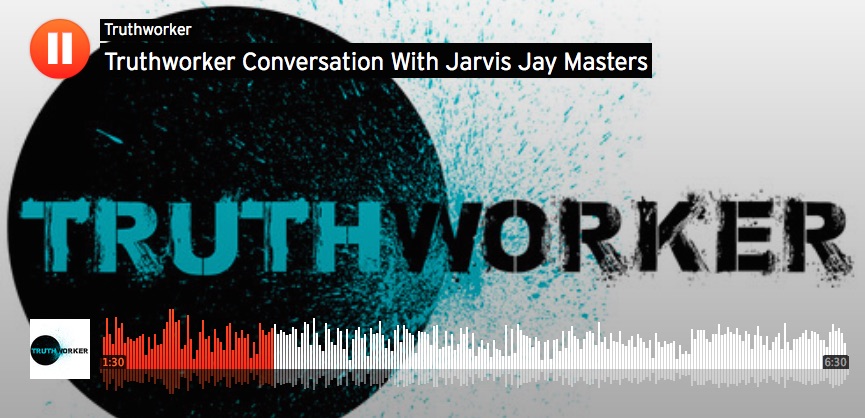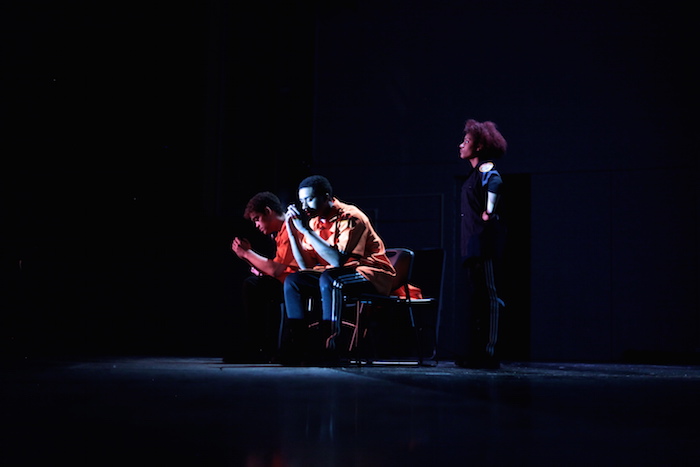Truthworker Theatre Company: Youth Voices Against the School to Prison Pipeline
Truthworker Theatre Company performing “BAR CODE: A Performative Analysis of the School to Prison Pipeline” at the Columbia University Mailman School of Public Health in New York in April 2014. From left: James Gagliardo, Oddisey Miller, and Leah Mohammed. (Photo: Liaizon Wakest)
.
BY RAJUL PUNJABI | THE IMPRISONED ISSUE | WINTER 2014/2015
“Almost every member of the Truthworker company has a family member who is currently or has been incarcerated,” says the company’s founder, Samara Gaev. “That was not a prerequisite. That just happens to be the case.”
Founded in July of 2013, the Truthworker Theatre Company brings together young people between the ages of 15 to 22 to create, write, and perform in productions that reflect stories from their own lives as well as those entangled in the prison industrial complex—stories that are often discounted and disregarded.
Choosing young people to produce and tell these narratives is an important part of Truthworker’s mission. Gaev believes that the voices about imprisonment that are given an audience do not often represent youth perspectives. Gaev, a New York City-based performance artist and educator could be the spiritual lovechild of activist Angela Davis and the Dalai Lama. Her militancy trumps her zen though, as she rejects the idea of accepting the things she cannot change. More like Davis, she’s decided to change the things that she just cannot accept. After nearly a decade in the New York City school system as a teaching artist, Gaev witnessed many of her students yearning for more opportunities to continue sharing their stories and growing professionally and personally through creative expression. In response, Gaev envisioned Truthworker as a space where those aspirations could become reality. Many of the company’s members include students that Gaev has previously worked with as a teaching artist.
![IMG_2583[7]](http://ofnotemagazine.org/wp-content/uploads/2014/12/IMG_25837.jpg) Samara Gaev with members of Truthworker Theatre Company performing at the Marion Institute’s Connecting for Change Conference in Bedford, Massachusetts in October 2013. From left: Oddisey Miller, Zafar Mohammed, Ricardo Matos, Jr., James Gagliardo, Ethan Romero, and Richard Perez. Photo Courtesy of Truthworker Theatre Company
Samara Gaev with members of Truthworker Theatre Company performing at the Marion Institute’s Connecting for Change Conference in Bedford, Massachusetts in October 2013. From left: Oddisey Miller, Zafar Mohammed, Ricardo Matos, Jr., James Gagliardo, Ethan Romero, and Richard Perez. Photo Courtesy of Truthworker Theatre Company
Truthworker’s first production, “BAR CODE: A Performative Analysis of the School to Prison Pipeline,” explores the criminalization of young people, which, as an arts educator, Gaev says she’s had a front row seat. It includes dance, poetry, hip-hop music, as well as traditional dramatic monologues.
Gaev believes that at a very tender age, young people are immediately sent the message that they are not to be trusted, that they are a threat to be contained. “I walk into schools and kids have to go through metal detectors and empty their pockets. On either side of them are school safety agents, which are in full police uniforms.” In “BAR CODE,” the company explores the dual systems within schools and prisons—schools run on bell systems just as in prison; the same corporation distributes food in prison also provides school lunches.
“BAR CODE” led Gaev and the company to think deeper about the school-to-prison pipeline and examine even more complex questions: How many of our nation’s youth are put in solitary confinement? Have we unpacked the correlation between mental illness and incarceration? What happens to those who are unjustly put on death row? This very inquiry led to their current production, “IN | PRISM: Boxed In and Blacked Out in America,” which examines the impact of solitary confinement using firsthand accounts.
[youtube width=”600″ height=”344″]https://www.youtube.com/watch?v=oBB3n58jCPk[/youtube]
This time, the stories told are an amalgam of the student perspectives and those of 52-year-old Jarvis Jay Masters, who is on death row at San Quentin State Prison in California. Institutionalized since 1981 at the age of nineteen, Masters was moved to death row in 1990 after being convicted for his part in the killing of a prison guard. He has spent twenty-two years in solitary confinement.

Listen to an intimate conversation between Jarvis Jay Masters and members of the Truthworker Theatre Company as they collaborate to develop “IN|PRISM: Boxed In & Blacked Out in America.”
A friend of Gaev’s connected her with Masters a few years ago when she started teaching his books to students who had been formerly incarcerated. Last June, Gaev visited Jarvis at the San Quentin Prison and invited him to collaborate with the company. Masters asked his publishers to send the company his books—he’s penned two while in prison: Finding Freedom: Writings from Death Row (1997) and That Bird Has My Wings: An Autobiography of an Innocent Man on Death Row (2009). The students dived in. “What we’re most inspired by is his capacity for liberation from this confinement,” says Gaev. To connect with Masters and learn his story, the company members have been communicating with him over the phone and using voice recordings of his messages to them.
At the pinnacle of her own activism, Gaev was hit with an unfathomable challenge that she says reaffirmed and complicated her perspective on the system. In 2008, on a night right after she completed her graduate work on trauma and the experience of the witness, she was sexually assaulted at gunpoint in her apartment building’s elevator. The young man who attacked her had done the same to several other women in the neighborhood and gotten away with it, threatening them with promises to kill them if they ever tried to go to the police.
Gaev clawed through this nightmare for years. She was called to testify against her assailant in 2010. While the man is now locked away (he received a sentence of 174.5 years), she finds no solace from the idea that her attacker is behind bars. “I found myself living exactly that which I was theorizing,” she says. The experience both complicated and reaffirmed her perspectives on the prison system. Years later, Gaev presses on. She aims to focus on her young people in the company, opening them further to the idea of compassion for others and most importantly, toward themselves.
In July of 2013, Gaev launched an Indiegogo campaign to cover production costs for a four week intensive for the company. She raised $9,000, which she stretched for an entire year to fund production costs, costumes, full color programs and working stipends for the student-actors as an affirming gesture of the value of their work.
After starting small, Truthworker has been gaining momentum. The invitations to perform now pour in. Truthworker has acquired partners like Jack, in Brooklyn, New York, which donated space for them to showcase their productions for larger audiences. And those audiences have been steadily growing—the group recently performed at the Connecting for Change Conference in Massachusetts and for Columbia University’s Mailman School of Public Health.
The productions have impacted many in the audience, who have often stood up at the end of the show to testify about their own experiences. But most of all, the storytelling has served as a form of therapy for the students. One student in the company, says Gaev, was so moved by her involvement in the production that she opened up a dialogue with an estranged sibling who is in prison.
“There’s been a triangulation of healing happening to all of us,” says Gaev.
♦
 Rajul Punjabi is a New York-based journalist and adjunct faculty at Long Island University in Brooklyn, New York City and Delgado Community College in New Orleans. With over seven years of magazine experience, Rajul has written extensively about hip-hop and also enjoys writing about race, fashion, art and gender. Her byline has appeared in Playboy, VIBE, The Village Voice, Urbanology, Rap-Up, and on Billboard.com and The Boombox.com. Twitter: @rajulpunjabi.
Rajul Punjabi is a New York-based journalist and adjunct faculty at Long Island University in Brooklyn, New York City and Delgado Community College in New Orleans. With over seven years of magazine experience, Rajul has written extensively about hip-hop and also enjoys writing about race, fashion, art and gender. Her byline has appeared in Playboy, VIBE, The Village Voice, Urbanology, Rap-Up, and on Billboard.com and The Boombox.com. Twitter: @rajulpunjabi.
Public Program: On November 13, 2014, the Institute for Research in African-American Studies at Columbia University and OF NOTE co-hosted a conversation with artists from The Imprisoned Issue who use their creative voice to illuminate the ways in which our society treats those within our prison systems with compelling work that engages and troubles our notions of ‘justice.’ Speakers: Samara Gaev, Russell Frederick, Lori Waselchuk, Dr. Samuel Roberts, Grace Aneiza Ali.
Watch the full video below or here.
OF NOTE Magazine is free to readers, free of advertising, and free of subscriptions—all made possible by generous supporters like you. Your tax tax-deductible gift will help us continue to feature innovative and emerging global artists using the arts as tools for social change. OF NOTE Magazine is a fiscally sponsored organization of the New York Foundation for the Arts, a 501 (c) (3), tax-exempt organization. All donations are 100% tax-deductible to the full extent of the law.



